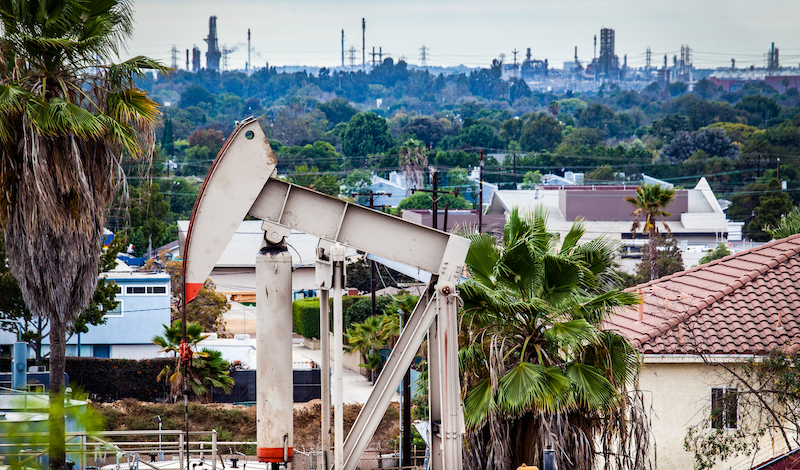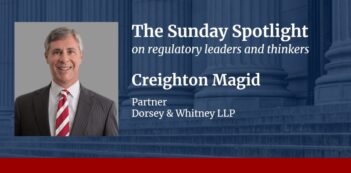
The oil and gas industry attempts to quash a California law protecting residents from extraction wells.
Earlier this fall, California Governor Gavin Newson signed into law environmental protections for California residents. Three days later, the oil and gas industry submitted to the state attorney general a proposed referendum that would reverse the new law.
In California, almost 3 million residents live within 3,200 feet of an active oil and gas well, and over 7 million residents live within one mile of a well. These residents are feeling the effects. In studying the air pollutants emerging from wells, scientists have linked cancer, asthma, and other long-term health defects to living near wells.
To protect Californians from oil and gas wells’ close-range impacts, the law will prohibit installment of new wells within 3,200 feet of houses, schools, hospitals, and other sensitive areas where people gather. This well-setback portion of the law is set to take effect in January 2023. In addition, the law would impose more stringent controls on well operators—such as requiring them to manage dust migration and submit a well “leak detection and response plan.”
But rather than embrace the importance of complying with the new well-setback law, the oil and gas industry has attempted to block the law’s implementation through a referendum. To win approval to add this referendum on the statewide ballot in 2024, challengers of the law will need to obtain about 625,00 signatures.
The California Independent Petroleum Association wasted no time in filing a proposed referendum soon after Newsom signed the bill into law. If the industry succeeds in getting the required number of signatures by December 15, 2022, the California Secretary of State will put the well-setback law on the 2024 ballot. Then, Californians would vote on whether to keep or overturn the well setback.
Even if the public votes in favor of the well setback in 2024, the industry will have at least succeeded in stalling the law’s implementation if it does obtain the requisite signatures. Under California law, statutes that are challenged via a referendum cannot take effect until the general electorate votes to pass it.
The oil and gas industry has already raised over $8.1 million to fund its referendum campaign, which it has dubbed, “Stop the Energy Shutdown.” The industry claims that well setbacks will decrease the state’s fossil fuel supply, leading to increased reliance on out-of-state fossil fuels and increased gas prices.
In addition, the industry alleges that the legislature passed the well-setback law “without any scientific basis.”
In passing the law, however, the legislature noted that studies reveal adverse health impacts on populations located within approximately 3,200 feet of oil and gas wells. Moreover, the Geologic Energy Management Division—the California agency that regulates oil and gas wells—sought experts’ opinion on whether nearby oil and gas developments negatively impact residents. The experts’ concluded with “a high level of certainty” that oil and gas development is associated with health defects.
Given methane leaks and discharges of hazardous particulate matter from wells, researchers have tied living near well operations with pre-term birth and increased cardiovascular risks, among other adverse health effects.
But not all Californians will suffer these health effects. Wealthier communities, such as the community of Palos Verdes, are exposed to less pollution from oil and gas operations. In contrast, poorer and non-white communities bear the brunt of oil and gas operations’ impacts. For instance, the community of Wilmington—a mostly non-white community—sits near the Wilmington Oil Field and suffers disproportionate pollution.
Francisco Gonzales, a resident of California’s “oil country” in Kern County, has reportedly explained that living near wells caused him to acquire allergies and asthma. Bakersfield, the largest city in Kern County, endures the most particulate matter pollution in the country, and roughly 70,000 residents have asthma. The childhood asthma rate in Bakersfield is three times the California average.
Meanwhile, one of the legislature’s purposes in enacting the well-setback law was to remediate disproportionate impacts on environmentally vulnerable communities. The legislature found that non-white communities are “most likely to live in close proximity to oil extraction activities.”
California Senator Lena Gonzalez (D-Long Beach), the law’s sponsor, has described California oil and gas operations as a “long-standing and glaring example of environmental racism.” Despite the industry’s efforts, Gonzalez is reportedly “optimistic that the referendum will not be successful.”
This is not the first time, however, that Big Oil has used the referendum process to overturn protective environmental laws.
Earlier this year, the oil and gas industry raised $8.2 million and successfully overturned an initiative in Ventura County that would have tightened environmental oversight of decades-old fossil fuel drilling permits. And in 2018, the industry poured millions into the referendum process to defeat a county-wide initiative in San Luis Obispo County that would have banned new oil and gas extraction.
Environmental advocates in California have seen the industry repeatedly use referenda and other tactics to overturn environmental initiatives. Coalition coordinator of Voices in Solidarity Against Oil in Neighborhoods, Kobi Naseck, has reportedly contended that the industry’s referendum on well setbacks outlines a familiar story: “Big Business and their millions of dollars vs. public health.”
Although the oil and gas industry has succeeded in overturning protective environmental laws via the referendum process in the past, Senator Gonzalez reportedly stated that the well-setback referendum will fail this time because, “more than ever before, people believe in a carbon- and fossil-free future.”
Against the backdrop of a growing public concern for climate change, advocacy groups such as Food & Water Watch are already organizing against the industry’s campaign to block well setbacks.
Even if the industry succeeds in getting enough signatures by December 15 to trigger the referendum, the people of California will have the last vote on well setbacks—and current trends forecast that Big Oil’s black mark on the Golden State will not leave a permanent stain.



